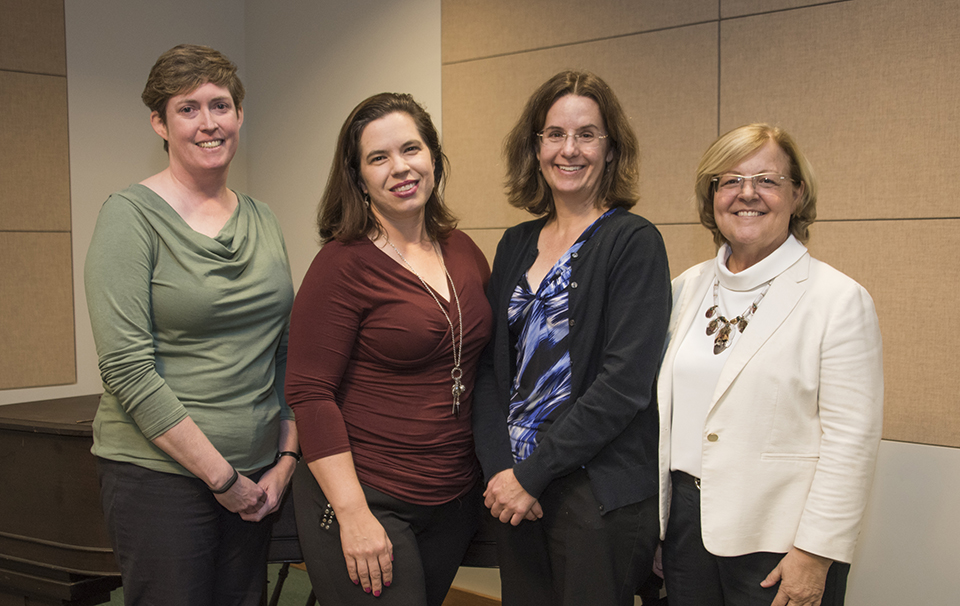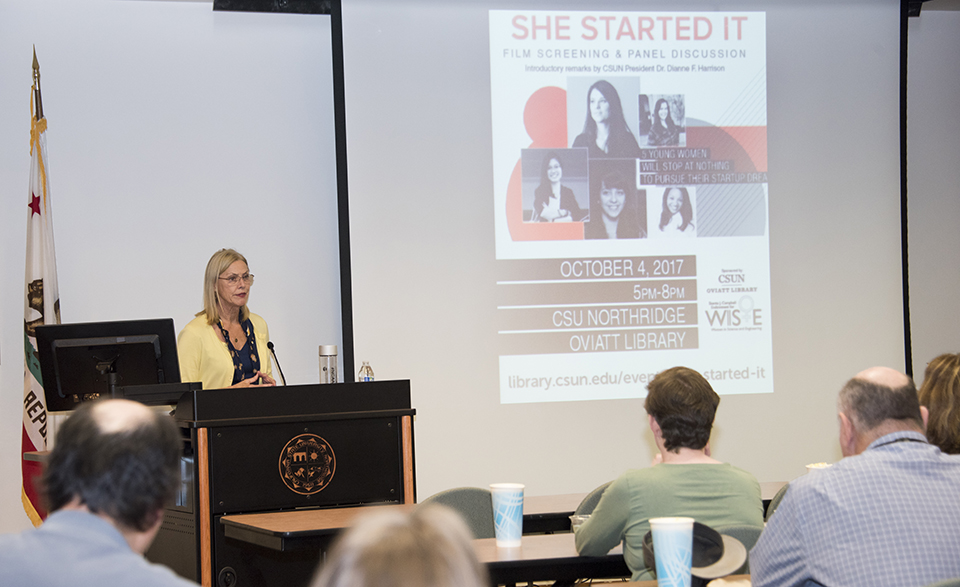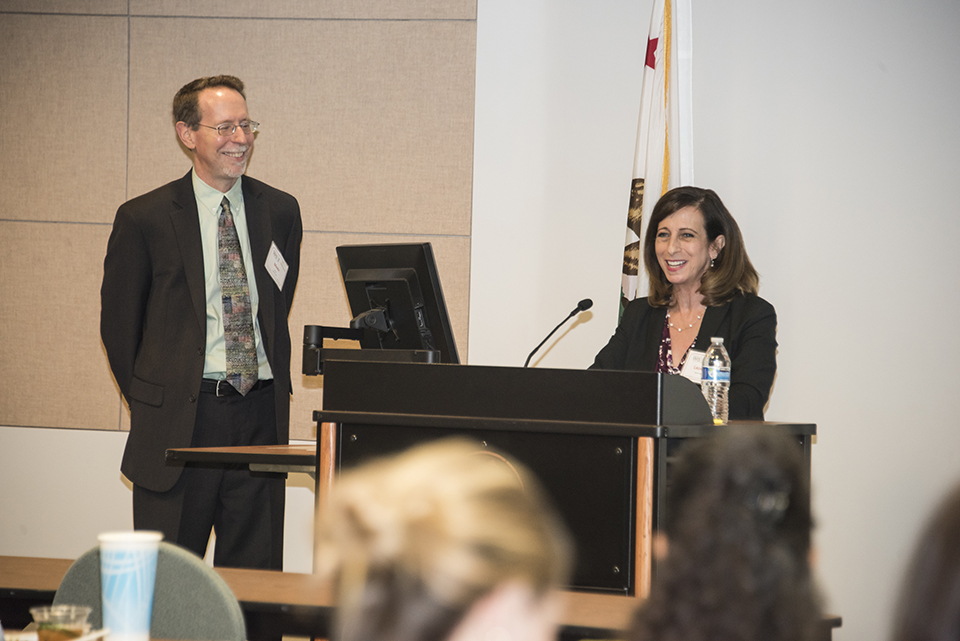She Started It! CSUN Event Aims to Inspire Female Entrepreneurs and STEM Majors
As they reached for the sky, the female technology entrepreneurs shown in the documentary She Started It! fought the gravity of societal norms and pressures.
In the film, which screened Oct. 4 in the Delmar T. Oviatt Library of California State University, Northridge, the protagonists are shown dealing with: the discouragement of girls from pursuing careers in technology and entrepreneurship, a lack of allies in the male-driven world of venture capitalism, and leadership systems that tend to undervalue the traits women can bring.
CSUN President Dianne F. Harrison applauded the film for celebrating creativity and innovation in the field of technology and innovation, and highlighting the important role women have played in spite of significant obstacles.
“CSUN is a catalyst for broadening the pool of talent and changing culture so that everybody has equal opportunity to succeed, and everyone’s contribution to progress is recognized. Sadly, women continue to be hindered and their stories untold, especially in the fields of technology, engineering, and innovation,” Harrison said. She added that films such as this, and universities such as CSUN, help ensure that the future of innovation is enhanced and expanded by fully utilizing the talents of everyone who is motivated and persistent regardless of their gender, skin color or economic background.
The event was presented by the Oviatt Library and the Bonita J. Campbell Endowment for Women in Science and Engineering (WISE). After the film, a panel of women with entrepreneurial and science, technology, engineering and mathematics (STEM) successes reacted to the movie’s themes and shared their own experiences of triumph and challenges.
The panelists—entrepreneurial engineer Carolyn Casavan, CSUN biochemistry professors Karin Crowhurst and Paula Fischhaber, and University of Southern California media arts and practice professor Tania Mulry—emphasized that women can bring valuable differences to enhance male-dominated fields, but if they want to lead in the same style as men, that should be OK, too.
“The whole business environment was built by men and it’s designed along their ways of thinking,” said Casavan, who began her career in research and manufacturing with Mobil Oil Corporation and now works as a sustainability and environmental consultant. “And we’re different. We have a lot of value to bring to the table. Instead of trying to fit into their world, we need to add our world to that world. I think that’s where women will succeed. We need to go to the institutions and say, ‘You need to understand the value women are bringing to the table and add them to your value chain.’”
There is also the resiliency factor that cannot be discounted among women breaking into these fields where they have been underrepresented. A key quote from the film came from Thuy Truong, a serial entrepreneur whose ventures included running and selling a frozen yogurt chain in Vietnam: “If plan A, plan B, plan C don’t work, there are 23 other characters in the alphabet.”
In addition to Truong, She Started It! highlighted entrepreneurs such as Stacey Ferreira, who was in high school when she co-founded MySocialCloud, which attracted the attention of Virgin magnate Richard Branson, who helped them secure $1 million in seed money; and Sheena Allen, whose mobile app company Sheena Allen Apps hosts six apps and has millions of downloads.
The film’s protagonists are shown mastering the tightrope walk of acceptable behavior for women pitching ideas to men in the business world: be approachable and likable, hold your own—but don’t be too assertive.
“One of the things that came back again in the movie and probably in all of our lives is the societal norms aspect: ‘This is not the way that a woman or girl acts or operates,’” said Crowhurst, who works with CSUN students on projects to further understanding of protein structure and function. “It did make me think about my own path, maybe I’m not socially in tune with other people, but I basically didn’t care. I’m sure all of us feel like we don’t belong in certain places at certain times, or ‘that these people must know way more than I do,’ but it’s just the idea of ‘this is what I want to do and if people don’t think I should do it, that’s too bad.’”
Truong and Ferreira are shown dealing with high-publicized failures, then deciding to start again.
“What the movie drove home for me is, regardless of what you try to do for a living, bringing that resilience is so important,” said Fischhaber, who conducts research on the biochemistry of DNA repair pathways, which protect organisms from cancer and aging. “The ability to keep going when you really wanted to give up is probably the most important characteristic I have. I saw that in all the women in that movie. If that’s the piece we can give our students here, I think they’re all going to be successful.”
Mulry, a founding member of the MasterCard Worldwide’s Information Products and Services team whose contributions continue to yield the company more than $45 million annually, agreed.
“To make a connection between entrepreneurship and science, one thing that really helps people cope as an entrepreneur when they need that resilience the most is to talk about business as an experiment,” Mulry said. “They really learn the scientific method, they learn they can have a hypothesis, they can test it, and they can see: Were they right, were they wrong? Either outcome is OK; they learn and they can adjust. And that’s exactly the way they can build a business.”




 experience
experience